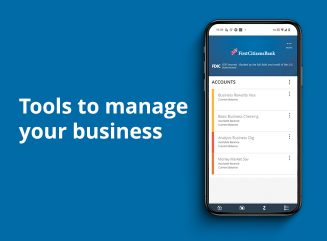
Digital banking for business
Seamlessly access all of your accounts from one place with First Citizens Digital Banking for business.

Control your portfolio
Invest how you want, when you want, in real time with Self-Directed Investing.

Digital banking for business
Seamlessly access all of your accounts from one place with First Citizens Digital Banking for business.
See how we're supporting companies
We're committed to serving companies as they expand and succeed. The proof is in our success stories.
Q4 Quarterly Market Review: Available now
The Making Sense team reviews changes in the market during Q4 2025.
If you're interested in homeownership but still making monthly payments on your higher education, you might be wondering whether you should pay off student loans or buy a house. The good news is you might be able to do both.

Having student loan debt isn't necessarily a barrier to making your dreams of owning a home come true. By assessing your unique financial situation and comfort level, you can determine whether debt payoff, homeownership or both are right for you.
Homeownership can offer a wide range of financial benefits. From possible mortgage interest deductions on your taxes to potentially decreasing your overall monthly housing expenses, depending on what rents are like in your area, buying a home definitely has appeal.
Here are a few reasons you might want to prioritize buying a home while you carry student loan debt.
It's important to note that many lenders offer mortgages designed for first-time buyers. These loans generally have less rigorous qualification criteria and may be more forgiving with student loan debt.
First-time buyers can also explore programs that offer down payment assistance to help ease the burden on your savings account and make homeownership a reality.
Depending on your situation, your student loans might be the most significant debt you've ever carried. While some student loans have relatively low interest rates and flexible repayment options, higher levels of debt can cause stress and have an effect on your financial health. A scenario like this might make paying down student debts your most pressing priority.
Here are some reasons why you might choose to pay off your student loans before you venture into a mortgage.
Just because you can qualify for a mortgage doesn't mean buying a home is the best decision for you. Take all these factors into consideration when determining if now is the right time to become a homeowner. While it's definitely possible to do both, it's important to look at multiple factors to see which path is right for you.
Whatever your homeownership goals might be, there are plenty of options available—from savings strategies to mortgage types—to help you make your dream a reality.



Links to third-party websites may have a privacy policy different from First Citizens Bank and may provide less security than this website. First Citizens Bank and its affiliates are not responsible for the products, services and content on any third-party website.
This material is for informational purposes only and is not intended to be an offer, specific investment strategy, recommendation or solicitation to purchase or sell any security or insurance product, and should not be construed as legal, tax or accounting advice. Please consult with your legal or tax advisor regarding the particular facts and circumstances of your situation prior to making any financial decision. While we believe that the information presented is from reliable sources, we do not represent, warrant or guarantee that it is accurate or complete.
Third parties mentioned are not affiliated with First-Citizens Bank & Trust Company.
First Citizens Bank & Trust Company is a Member FDIC and an Equal Housing Lender icon: sys-ehl.
NMLSR ID 503941

Treasury & Cash Management
Electronic Bill Presentment & Payment
Investment & Retirement Services
Community Association Banking
Equipment Financing & Leasing
Credit Cards
Merchant Services
Email Us
Please select the option that best matches your needs.
Customers with account-related questions who aren't enrolled in Digital Banking or who would prefer to talk with someone can call us directly.